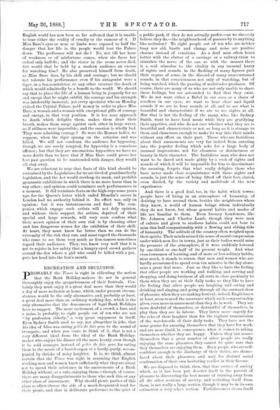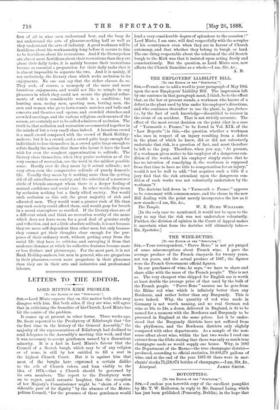RECREATION AND SECLUSION.
PROBABLY the Times is right in ridiculing the notion that the Bank Holiday-makers do not in general thoroughly enjoy the gregariousness of their festivals. Cer- tainly they must enjoy it a great deal more than they would a day of mere seclusion at home, which, under present circum- stances, would be the only alternative, and, probably at least, a great deal more than an ordinary working-day, which is the only alternative that the denouncers of legal Bank Holidays have to suggest. The mere excitement of a crowd, a fuss, and a noise, is probably, to eight people out of ten who are not " by profession elderly," a very great enjoyment in itself. Even Sydney Smith used to say, not altogether in joke, that his idea of bliss was eating p(iMs de foie gras to the sound of trumpets ; and when you come to think of it, that is not a very different ideal from the ideal of the Bank Holiday- maker who enjoys his dinner all the more keenly, even though it be cold sausages instead of piitjs de foie gras, for eating them to the music of a barrel-organ or a hurdy-gurdy, accom- panied by shrieks of noisy laughter. It is, we think, almost certain that the Times was right in assuming that English working men and women know sufficiently what they are about not to spend their substance in the amusements of a Bank Holiday without, as a rule, enjoying them,—though, of course, there are many disappointments to those who seek this or any other class of amusement. Why should picnic parties of thjs class so often choose the side of a much-frequented road for their picnic, and that in deliberate preference to the quiet of
a public park, if they do not actually prefer,—as we sincerely believe they do,—the neighbourhood of passers-by to anything like seclusion ? To eight people out of ten who are neither busy nor old, bustle and change and noise are positive charms instead of vexations. As a deaf man often hears better with the clatter of a carriage or a railway-train to stimulate the nerve of the ear, so with the masses there is a real stimulus to the vitality in any unusual hurry of sights and sounds, in the flashing of many figures past their organs of sense, in the discord of many unaccustomed sounds, in that consciousness not only of watching, but of being watched, which the passing of multitudes produces. Of course, there are many of us who are not only unable to share these feelings, but are astounded to find that they exist. We do not want either a Babel in our ears, or a chaos of revellers in our eyes ; we want to hear clear and liquid sounds if we are to hear sounds at all, and to see what is beautiful and characteristic if we are to see sights at all. But that is not the feeling of the many, who, like Sydney Smith, want to have loud music while they are gratifying their appetites, and who do not care whether what they see is beautiful and characteristic or not, so long as it is strange to them, and clamorous enough to make its way into their minds without any effort on their part. Those who are fastidious about their amusements are very far indeed from entering into the popular feeling which asks for a large body of unusual impressions, not for clearness or distinctness or beauty in their character. The fastidious man who does not want to be dazed and made giddy by a rash of sights and sounds of which it will be impossible for him to discriminate the meaning, forgets that what really delights those who have never made close acquaintance with these sights and sounds, is just the sense of being lifted off their feet, elated, even dizzied, by the variety and multitude of the new experiences.
And there is a good deal, too, in the habit which towns- people have of living in an atmosphere of humanity, of desiring to have around them, besides the neighbours whom they know, a world of human beings whom individually they do not know, but whose general habits and modes of life are familiar to them. Even literary Londoners, like Dr. Johnson .and Charles Lamb, though they were men of culture and given to studious habits, could not bear to miss this half-companionship with a flowing and ebbing tide of humanity. The solitude of the country often weighed upon their spirits. Their minds missed the sense of moral compression under which men live in towns, just as their bodies would miss the pressure of the atmosphere, if it were suddenly lowered by one-third or one-half of its present weight. And what even townsmen of learning, and of more or less solitary habits, miss much, it stands to reason that men and women who are hardly accustomed to spend even ten minutes in the day alone, miss a great deal more. Just as they like to have the feeling that other people are working and walking, and serving and shopping, and doing business of all sorts in close proximity to them when they are at their daily tasks, so they like to have the feeling that other people are laughing and eating and drinking and singing, and going through all the outward show of pleasure, when they are making festival; indeed, Englishmen at least, seem to need the assurance which such companionship gives, even more in amusement than they do in work. They are more doubtful of themselves, or distrustful of themselves, in play than they are in labour. They listen more eagerly for the echo of their laughter than for the vigilant transmission of the watchwords of their daily tasks. They have not the same genius for amusing themselves that they have for work, and are more timid, in consequence, when it comes to asking themselves whether they are happy. Unless they can assure themselves that a great number of other people are really enjoying the same pleasures, they cannot be quite sure that they themselves are enjoying them. Even people who are self- confident enough in the discharge of their duties, are shame- faced about their pleasures, and wait for distinct social confirmation of their own hesitating verdict in their favour.
We are disposed to think, then, that that section of society which, as it has been put, devotes itself in the pursuit of pleasure to discovering the best means of running away from all the other sections of society, and secluding itself from them, is not really a large section, though it may be in its own estimation a very select section. Fastidiousness shows itself first of all in what men understand best, and the busy do not understand the arts of pleasure-seeking half as well as they understand the arts of industry. A good workman will be fastidious about his workmanship long before it occurs to him to be fastidious about his recreations. And if the literary class are almost more fastidious about their recreations than they are about their daily tasks, it is mainly because their recreations become so essential a preparation for their daily tasks that it is almost impossible to separate the two. And it is mainly, if not exclusively, the literary class which seeks seclusion in its enjoyments. No one can say that the richer classes do so. They seek, of course, a monopoly of the rarer and more luxurious enjoyments, and would not like to mingle in any pleasures in which they could not secure the physical refine- ments of which considerable wealth is a condition; but hunting men, racing men, sporting men, betting men, the men and women who go to lawn-tennis matches and balls and concerts and theatres and operas, and crowded churches and crowded meetings, and the various religious excitements of the season, are certainly not to be called admirers of seclusion. The truth is, that seclusion and recreation are connected together in the minds of but a very small class indeed. A luxurious crowd is a small crowd compared with the crowd of Bank Holiday- makers ; but it is a crowd, and a crowd quite large enough for individuals to lose themselves in, a crowd quite large enough to refute finally the notion that those who haunt it have the least wish for even the roughest approximation to solitude. The literary class themselves, when they praise seclusion as of the very essence of recreation, use the word in the mildest possible sense. Hardly ever do they mean by it actual solitude ; not very often even the comparative solitude of purely domestic life. Usually they mean by it nothing more than the getting rid of all miscellaneous society, and the selection of a narrower circle of friends amongst whom there is a deeper feeling of mutual confidence and social ease. In other words, they mean by seclusion nothing but a finely sifted society. Nor would such seclusion as this suit the great majority of rich and educated men. They would want a greater rush of life than any such society could afford them, and would gasp for breath in a moral atmosphere so rarefied. If the literary class are of a different mind, and think no recreation worthy of the name which does not leave room for a good deal of genuine study and reflection, and not a little absolute solitude, it is not because they are more self-dependent than other men, but only because they cannot get their thoughts clear enough for the pur- poses of their ordinary work, without getting away from the social life they have to criticise, and surveying it from that moderate distance at which its collective features become more or less distinct and picturesque. For the most part, it is not Bank Holiday-makers, but men in general, who are gregarious in their pleasnres,—even more gregarious in their pleasures than they are in their arts and industries and professional labours.



































 Previous page
Previous page